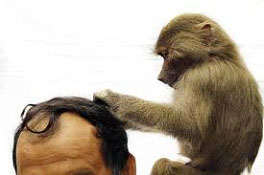|
|
『豢养猩猩、老虎和熊等野生动物作为宠物的行为是否应该被管制或禁止?』
Exotic Animals as Pets: An Unregulated Risk
私人豢养外来野生动物:风险尚存
Oct. 20th, 2011 | From The New York Times

IMAGINE the panic and terror experienced by the monkeys, bears, lions and leopards that ran loose in Ohio earlier this week as they were chased and then killed by the police. Imagine the heartbreak of the police officers who were obliged to destroy the rambling menagerie. Officers are not trained to stalk big game and bring them in alive with tranquilizer darts.
Why was there no law regulating the animal collection of Terry Thompson, who freed his animals and then apparently killed himself?
I’ve spent the last few years prowling America in search of people who share their lives with great apes, big cats and long snakes. Mr. Thompson is not unique.
Monkeys seem particularly ubiquitous; a cursory online search can connect you with a purveyor. Exotic animal auctions are crowded with buyers, and the Captive Wild Animal Protection Coalition — which opposes the practice — estimates the number of exotic fanciers in the millions.
Owners who bond with their pets as cubs or kittens, bottle-feed and cuddle them, often convince themselves that their relationship is special and their full-grown bear or cat will never turn on them. Yet it’s not just about cuteness and beauty; controlling an animal that arouses fear in other people can be appealing. That’s why those with egos that need feeding, from Kublai Khan to William Randolph Hearst to Mexican drug traffickers, are connected by the desire to stock their personal zoos.
Most apes, cats, bears and other animals change when they reach adolescence. They become stronger, more aggressive and less predictable. But is their potential to cause trouble enough reason to regulate or prohibit keeping them as household pets? If we allow ourselves to keep dogs (which can be out of control and vicious), why not other animals like chimpanzees, even if they also might exhibit violent behavior?
Champions of exotic pet ownership insist that their rights to enjoy the animals outweigh the risks. “This was not an animal getting out because of a failed cage,” Zuzana Kukol, an exotic-animal owner, told me when I checked in with her after the Ohio massacre. “The cage was fine. This was a deliberate act of terror.”
I visited her and her partner, Scott Shoemaker, on their Nevada desert spread, far removed from their neighbors and home to Bam-Bam, their 500-plus pound lion, and an assortment of other cats. The two lobby against laws restricting animal ownership. Their isolated compound seems a rare example: well fenced, with animals rescued or bred in captivity, apparently healthy. It’s hard to imagine a better alternative for Bam-Bam and their other animals.
Yet this week’s events in Ohio and other tragic cases prove that exotic animals present challenges. Nationwide, the laws on keeping wildlife as pets are a confusing patchwork. Enforcement of those that exist is haphazard, and penalties for violations are rarely severe.
“Exotic” is a fluid term for pets, but we ought to be able to agree on a list of animals that historically do not cohabitate with humans and pose such a threat that they must be caged. Then it’s an easy step to come up with federal laws to protect the animals and their neighbors. It’s past time to regulate the wild beasts: us. (535 words)
文章地址:
http://www.nytimes.com/2011/10/20/opinion/exotic-animals-as-pets-an-unregulated-risk.html |
|